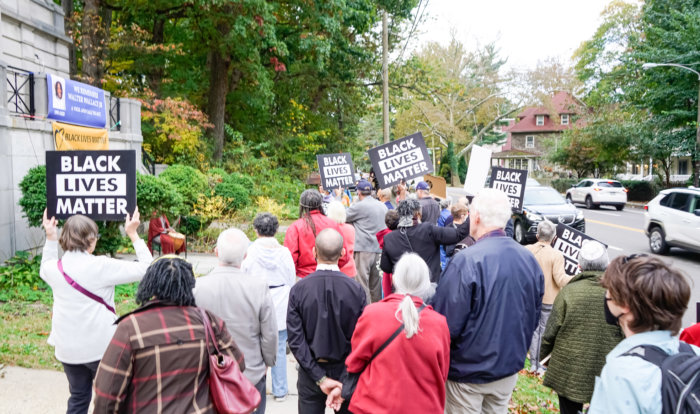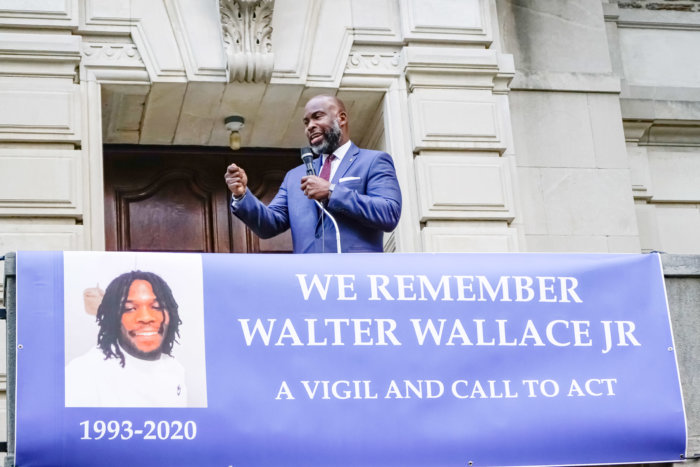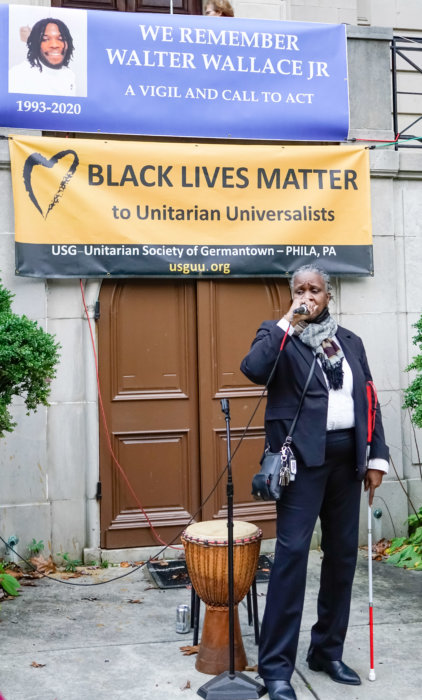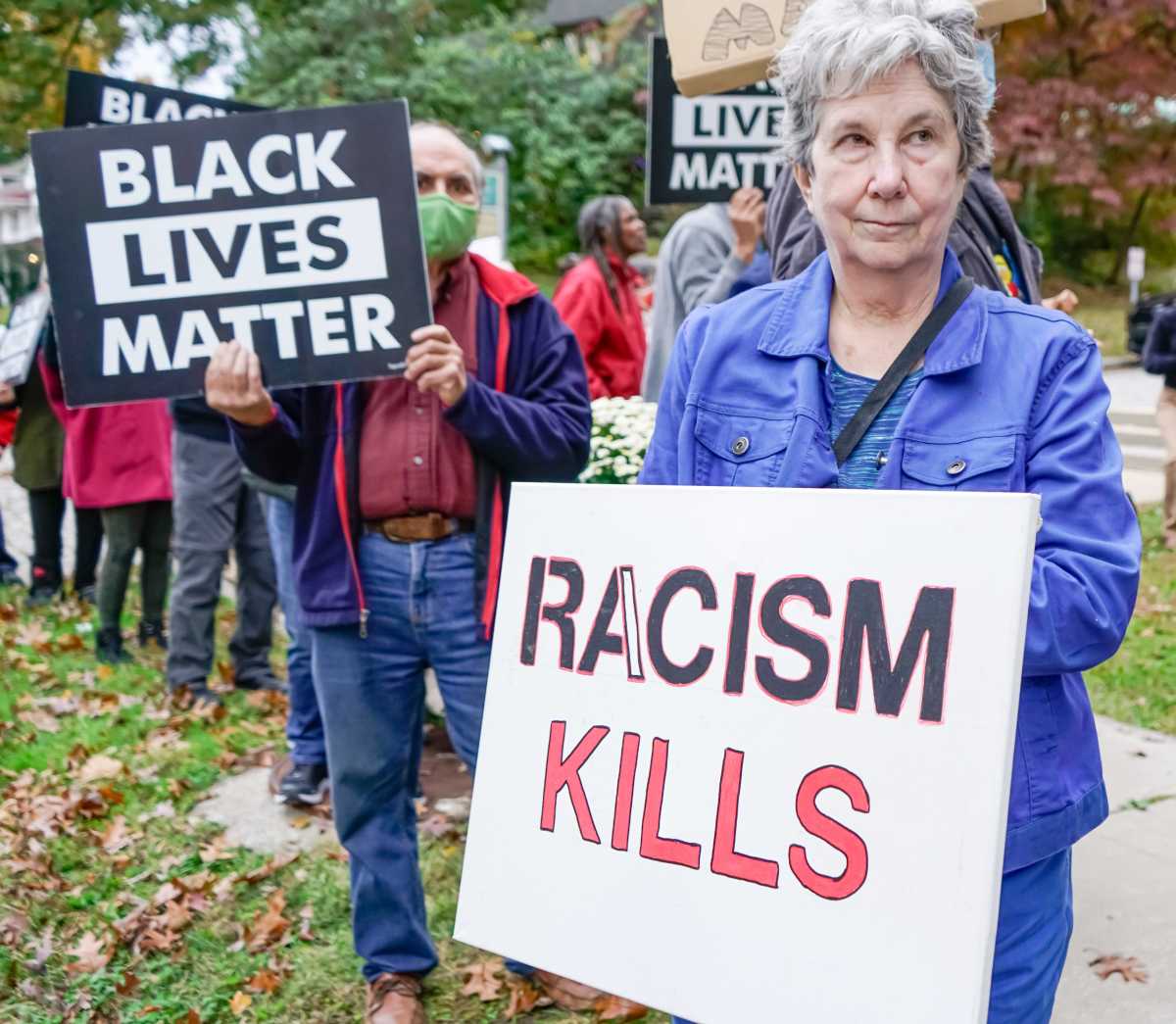Forty-six seconds after Walter Wallace, Jr. walked out of his parents’ Cobbs Creek home, and one year since Philadelphia police shot and killed the newlywed father of eight, Rev. Art Brown stood on Lincoln Drive waving a “Black Lives Matter” sign at passing motorists. On Wednesday evening, Brown joined activists and civic leaders at the Unitarian Society of Germantown, where POWER Interfaith’s Live Free Campaign held a vigil to commemorate the anniversary of Wallace’s death at the hands of police officers Sean Matarazzo and Thomas Munz.
“I wanted to make our presence known,” Brown said. “The brother is no longer with us, but we’re here.”
The diverse crowd, a tapestry of different races and religions, paid their respects at an hourlong event punctuated by live music and boisterous speeches, capped off by Rabbi Linda Holtzman’s reading of the Mourner’s Kaddish — the Jewish prayer for the dead. But, in the words of POWER Interfaith’s Rev. Mark Kelly Tyler, the vigil was also a call to act. Wallace was one in a long line of Black men and women across the country, including George Floyd, Breonna Taylor, Philando Castile, and more slain by law enforcement — a systemic problem for which activists continue to demand change.

When asked if progress has been made since the death of Wallace, Brown gave an emphatic, one-word answer. “Nah,” he said.
A year after the tragic death of 27-year-old Wallace, a young husband and father struggling with bipolar disorder, activists continue to press city officials for answers regarding the systemic over-policing of African American communities and law enforcement responses to individuals experiencing mental health crises. Along with efforts to improve behavioral health responses during 911 calls, the city, led by Mayor Jim Kenney and in coordination with Wallace’s family, announced a plan to spend $14 million on nonlethal Tasers for all police officers. Still, according to Tyler and the people behind POWER Interfaith’s Live Free Campaign, Philadelphia needs to enact more substantive change to ensure that what happened to Wallace doesn’t happen again.
The reverend was quick to note that, despite the societal pressure placed on this tragedy, at its core is a family who lost its son, a wife who lost her husband, and children who will never see their father again. In addition, as with the murder of so many Black men and women by law enforcement, Wallace’s death inflicted a generational trauma that permeates throughout the community.
“When I see [Walter Wallace] I see how easily that could have been me on so many occasions,” Tyler said. “I get pulled over for a ticket and I’m in a crappy mood like people have a right to be. I just don’t feel like being stopped by the police. And I’m upset cause I’m getting the ticket and how that action could have gone in a different direction and led to me being slain on the side of the road, simply because somebody is overly afraid of me, for no other reason than what they see on the outside.”

Kenney, too, marked the anniversary by acknowledging the pain and trauma felt by Wallace’s family and the community. In a statement, he noted the need for immediate change, highlighting efforts his administration took in the wake of George Floyd’s death last year and the nationwide protests that followed. The city’s Pathways to Reform, Transformation, and Reconciliation Steering Committee, which launched in summer 2020, began firm efforts toward equity across the region while attempting to implement improvements to how police respond to behavioral health situations.
Current reforms in progress include embedding Department of Behavioral Health and Intellectual disAbility Services staff in 911 call centers, plans to implement expanded Community Mobile Crisis Response Services, and some additional disciplinary penalties in the latest Fraternal Order of Police contract, among other things.

“I recognize that this is a very difficult time for the family of Walter Wallace, Jr. and for the entire City of Philadelphia,” the mayor said in a statement. “In the last year, the city has worked across institutions, departments, community leaders, and organizations to enact meaningful reforms, re-imagine public safety, and advance racial justice. While our work is not done, we remain strongly committed to these goals and to making our city the best, fairest, and most equitable that it can be. I am resolved to devote every remaining day in this office to bringing about justice and true equity in our city.”
For all of the progress touted by the mayor’s administration, many activists and nonprofit organizations see an urgent need for more to be done. Tyler explained that there would be a steady drumbeat of pressure on civic leaders until families in distress could call an alternate phone number instead of 911 and receive help from unarmed first responders. Then there’s Tyree Wallace — no relation — who founded the nonprofit Systemic Reformative Change while still currently imprisoned. As the name suggests, his organization seeks societal change on a systemic level.
“As someone overly concerned about systems and the community, thinking about Walter Wallace in particular who was having a mental health crisis, the police were too quick to shoot and he wound up dying,” Wallace said. “It wasn’t totally their fault, as they were ill-equipped to deal with the situation, but there needs to be systemic change regarding how we deal with mental health issues.”
Activists and organizers aren’t the only ones calling for change on the anniversary of Wallace’s death. At Wednesday evening’s vigil, State Rep. Christopher Rabb and City Councilmember At-Large Derek Green — the only two legislators in attendance out of a long list of invitees — promised those in attendance justice and that they would continue to fight. And despite a tiny moment of tension when someone in attendance asked Green whether or not officers Matarazzo and Munz were back on duty, to which the Councilperson replied he didn’t know and would have to find out, the crowd was, for the most part, on their side.
Early in the evening’s program, Tyler asked those in attendance to pause for a 46 second moment of silence. “That’s about the exact amount of time from when he walked out of his house, until he was shot dead,” Tyler said. “In 46 seconds of arriving, seeing him, he was shot six times.”
“We have a full list of demands that will be read in just a moment,” he continued. “But what I want to say to you is that no one should be shot dead within 46 seconds.”


























